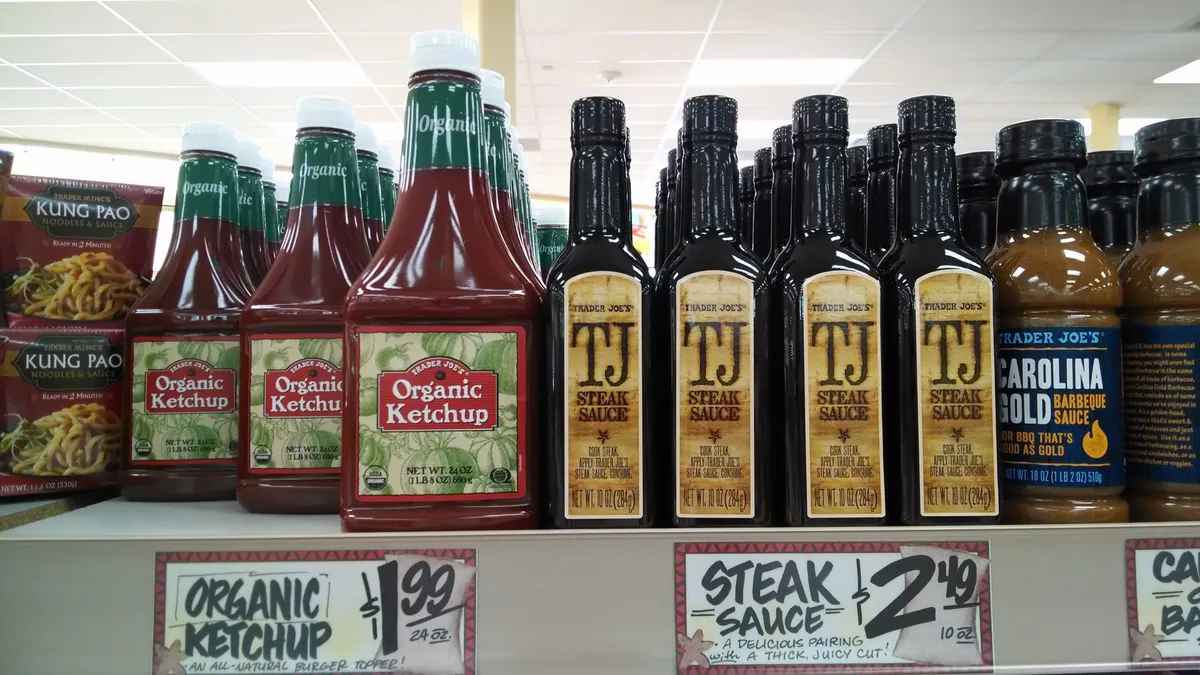Dive Brief:
- Kroger sued Lidl last month for trademark infringement, claiming the discounter’s Preferred Selection private brand is too similar in name and appearance to its Private Selection brand, according to Store Brands. A judge ruled against the Cincinnati-based retailer in a preliminary hearing and set a court date for January.
- Kroger’s Private Selection and Lidl’s Preferred Selection are just two examples of private label brands that have similar names and qualities, according to Store Brands. Other examples include Aldi’s Kirkwood brand and Costco’s Kirkland Signature line, as well as Kroger’s Simple Truth, Aldi’s SimplyNature and Ahold Delhaize’s Nature’s Promise.
- Despite some surface-level similarities, Lawrence Aylward, Store Brands’ editor-in-chief, writes that top retailers will find ways to make their store brands stand out. Brand expert Todd Maute of the New York agency CBX feels the Kroger-Lidl lawsuit reflects the success that private brands have achieved in recent years, and signals their growing power.
Dive Insight:
Major food companies have a long history of vigorously defending their brands through trademark litigation. In 2014, The Hershey Company filed a lawsuit against LBB Imports, claiming the company’s imported candy products, including Yorkers and Maltesers, bore too close a resemblance to Hershey’s York, Malteser, Reeses and other brands. Last year, Pinnacle Foods sued Kraft-Heinz over its Devour frozen meal brand’s tagline (“Satisfy Your Cravings”), which Pinnacle claimed was too similar to its Hungry Man brand slogan (“Satisfy Your Craving").
Aside from being entertaining to follow, these lawsuits are a sign of how important brands are for manufacturers. Developed over many years with millions of dollars in investments, top brands are extremely valuable assets that companies will fight to protect from even the slightest perceived infringement.
As Kroger’s recent lawsuit against Lidl shows, private label brands have achieved this same level of importance to retailers. In addition to being a sharp-elbowed strategy, the lawsuit signals that each retailer considers their private label offerings to be key weapons in a crowded industry.
Success breeds imitation, so successful brands like Kroger’s Simple Truth and Whole Foods’ 365 will likely inspire similar efforts from other grocers. More lawsuits could very well follow as a result. But grocers are figuring out how to stand out in other ways. Southeastern Grocers, for instance, recently unveiled a three-tiered store brand lineup that includes a value, everyday and premium line. This is a common store brand approach, but Southeastern focused on quality by removing artificial ingredients, developing many new products and testing them with shoppers.
These unique approaches should continue to pay off for retailers. According to The Wall Street Journal, store brands have shot up to 17% of total grocery sales, and show no signs of slowing down.










